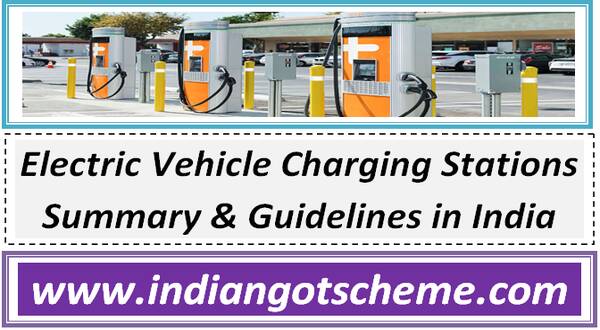Electric Vehicle Charging Stations Summary & Guidelines in India
This document outlines the response from the Minister of State in the Ministry of Power regarding the establishment of guidelines for public electric vehicle (EV) charging stations. Here’s a summary of the key points addressed in the response:
Guidelines for Public EV Charging Stations
Issuance of Guidelines: The Ministry of Power issued guidelines titled “Guidelines for Installation and Operation of Electric Vehicle Charging Infrastructure-2024” in September 2024.

Ceiling Cost for Electricity Supply:
- The total fee at EV charging stations includes the electricity tariff, service charge, land cost, and applicable GST.
- The tariff for electricity supply to EV Charging Stations is set as a single-part tariff and will not exceed the Average Cost of Supply (ACoS) until March 31, 2028.
- During solar hours (from 9 am to 4 pm), the Distribution Licensee can charge up to 0.7 times the ACoS, while during non-solar hours, it may be 1.3 times the ACoS.
Specific service fees are established for AC and DC charging:
AC Charging:
- Rs 3.0 per unit during solar hours
- Rs 4.0 per unit during non-solar hours
DC Charging:
- Rs 11.0 per unit during solar hours
- Rs 13.0 per unit during non-solar hours
Monitoring and Evaluation:
The Bureau of Energy Efficiency (BEE) is designated as the Central Nodal Agency to oversee the implementation of these guidelines.
States are encouraged to establish a State Nodal Agency to collaborate with Distribution Companies (DISCOMs) and the respective State Electricity Regulatory Commissions to facilitate electricity connections for various types of charging stations.
States should also form a State Level Steering Committee led by the Secretary in-charge of Energy, incorporating members from transport, municipal administration, and urban development to plan and monitor the implementation of EV Charging Infrastructure at the state level.
These measures aim to promote the adoption of electric vehicle charging infrastructure across India, ensuring standardized pricing and improved coordination among relevant agencies.
ANNEXURE
ANNEXURE REFERRED IN REPLY TO PARTS (a) & (b) OF UNSTARRED QUESTION NO. 3437 ANSWERED IN THE LOK SABHA ON 20.03.2025
*************
States/ UTs where tariff for supply of electricity to Public EV Charging Stations is single part not exceeding Average Cost of Supply
| Sl. No. | State Name | Electricity Supply tariff (EV) to PCS (₹/unit) | |
| LT | HT | ||
| 1 | Andaman & Nicobar | 12.0 | 12.0 |
| 2 | Andhra Pradesh | 6.7 | 6.7 |
| 3 | Arunachal Pradesh | 5.0 | 11 KV: 4.2, 33KV: 4.0 |
| 4 | Bihar | 8.72 | 7.85 |
| 5 | Chandigarh | 3.8 | 3.6 |
| 6 | Chhattisgarh | 6.92 | 6.92 |
| 7 | Delhi | 4.5 | 4.0 |
| 8 | Goa | 4.75 | 4.75 |
| 9 | Haryana | 6.48 | 6.12 |
| 10 | Lakshwadeep | 7.8 | 7.8 |
| 11 | Madhya Pradesh | 6.9 | 6.9 |
| 12 | Meghalaya | 8.5 | 8.5 |
| 13 | Odisha | 5.0 | 5.0 |
| 14 | Puducherry | 5.75 | 5.75 |
| 15 | Punjab | 6.28 | 6.28 |
| 16 | Telangana | 6.0 | 6.0 |
| 17 | UT OF D&NH AND D&D | 5.1 | 4.9 |
| 18 | Uttarakhand | 7.0 | 7.0 |
| 19 | West Bengal | 6.0 | 6.0 |
Source: Click here to view/download PDF
